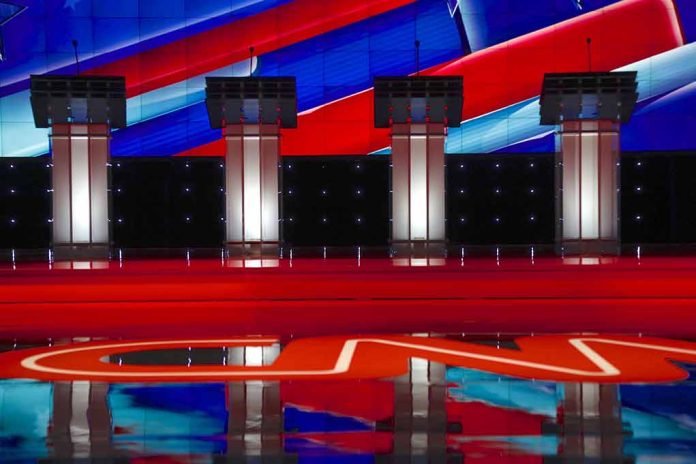
We are about to witness a political face-off between former President Donald Trump and Vice President Kamala Harris. The sparks have already started flying, and this debate promises to be one for the history books. Trump and Harris are set to clash on issues crucial to our nation’s future—economy, healthcare, and immigration. This debate is not just another talking point; it’s a vital battleground for Americans aged 40 and up who treasure conservative values and patriotic zeal. Why should you care about the debate? Because in the age of social media, the battle extends far beyond the debate stage.
Economy
The debate will likely kick off with a heated discussion on the economy, a cornerstone of both candidates’ platforms. Trump will be emphasizing his track record of tax cuts and deregulation efforts, which he argues are the key to an economic boom. Conversely, Harris will likely focus on wealth redistribution and increased social spending, attacking Trump’s policies as favoring the wealthy.
Social media platforms have transformed how these economic policies are discussed and debated. Real-time interaction and diverse viewpoints available on platforms like Twitter and Facebook offer immediate reactions and analyses. However, these platforms also introduce risks, including the rapid spread of propaganda and disinformation.
Healthcare
Healthcare remains a pivotal and contentious issue between the two candidates. Trump’s focus on reducing healthcare costs through market-driven mechanisms contrasts sharply with Harris’s emphasis on government-funded healthcare solutions.
The nature of social media allows for the quick spread of both genuine information and misleading propaganda. According to Modern Diplomacy “Misinformation and propaganda on social media can harm democratic norms and institutions.” The healthcare debate is a perfect example of how social media can amplify or distort key policy issues.
Immigration
When it comes to immigration, Trump’s hardline stance will be laid bare against Harris’s advocacy for more open and inclusive policies. Trump will likely tout his efforts in building stronger borders and reducing illegal immigration, whereas Harris will push for comprehensive immigration reform.
Hate speech and disinformation are particularly potent in immigration debates, often polarizing public opinion “Social media’s rapid messaging and multiplier effects can quickly amplify certain messages or influencers,” which is especially relevant in emotionally charged topics like immigration.
Personal Attacks
We can expect the personal attacks to fly fast and furious. Trump isn’t one to shy away from calling out what he sees as Harris’s failings, and Harris has shown she’s ready to push back just as hard. This dynamic is already being played out on social media, where segmented echo chambers only serve to heighten the drama.
**Quote:**
“As populist actors use social media to bypass traditional media and directly engage large audiences,” it becomes glaringly evident how these platforms are shaping public opinion around such debates.
The Role of Social Media
So why does social media matter in this debate? Simply put, it frames how the public perceives both candidates and their policies.
The algorithms and echo chambers of social media platforms reinforce biases and limit exposure to different viewpoints, thus shaping our political landscape through targeted political advertising and hashtag campaigns. Without question, social media influences public agenda and policy outcomes, often amplifying voices that might otherwise go unheard in traditional settings.
In conclusion, as Trump and Harris take the stage, remember that the discourse extends far beyond the debate hall. The real battleground is playing out in your social media feeds, shaping not just opinions, but the future of American democracy. Stay informed and think critically—our nation’s integrity depends on it.













